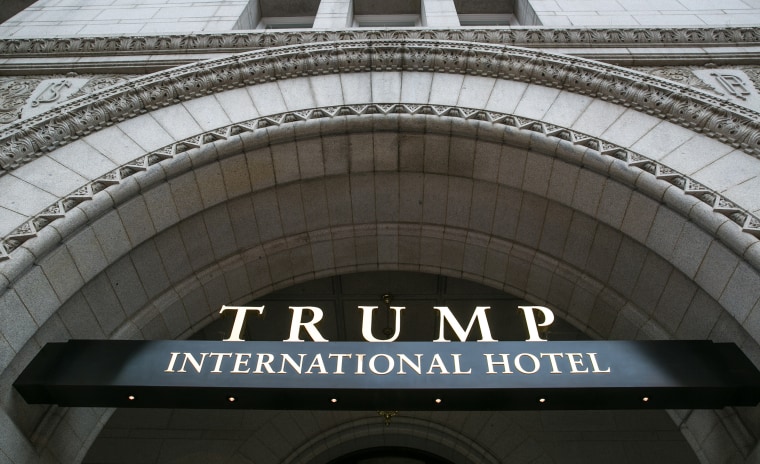If you’re old enough to have taken a civics class, you might have read the words in the foreign emoluments clause of the Constitution. But you probably don’t remember them, because until recently almost no one was paying close attention to the language dedicated to ensuring that, as much as possible, American officials’ loyalties aren’t divided between the United States and foreign countries. Then a billionaire international real- estate mogul became the commander in chief.
Now the language barring federal officeholders from accepting “any present, Emolument, Office, or Title, of any kind whatever, from any King, Prince, or foreign State” has become a prominent line of attack for opponents of the president. On Wednesday, however, some of these opponents suffered one of what is likely to be many rebuffs by judges on this charge.
The ruling suggests that clearing the initial hurdle laid out to make such a challenge will be nearly impossible via litigation.
The United States Court of Appeals for the Fourth Circuit, based in Virginia, threw out a suit filed by the District of Columbia and the state of Maryland that claimed President Donald Trump had violated the emoluments clause by benefiting economically when representatives of foreign governments patronized his places of business — in particular the Trump International Hotel in Washington.
The court dismissed the suit on the basis of a narrow issue — but it’s a fundamental one with wide-ranging implications. In fact, the ruling suggests that clearing the initial hurdle laid out to make such a challenge will be almost impossible via litigation, and that those who see the emoluments clause as a promising course for resisting the president are wasting their time. It’s a sign of the broader challenge facing those who seek to use constitutional restraints to check the executive or hold the president accountable.
The issue was whether the district and the state could bring the suit at all. For a suit to proceed in federal court, a plaintiff must have what’s referred to as “standing.” In cases that challenge a government official’s actions, a plaintiff must be able to allege more than a general unhappiness with the actions. I’m often horrified by what the government does, but I don’t have standing to complain in court about those actions unless they have affected me in some relatively specific way. In legal parlance, I must have suffered an “injury in fact.”
That makes sense. As a matter of constitutional law, federal courts can deal only with “cases or controversies.” If that weren’t a requirement, the courts would be buried in lawsuits by citizens. (Courts would also wind up with even more power over the everyday affairs of government than they now have, probably not a good thing.)
SIGN UP FOR THE THINK WEEKLY NEWSLETTER HERE
In this suit, D.C. and Maryland had claimed that when the president, in their eyes, unconstitutionally accepted money from foreign officials staying at the Trump hotel, the plaintiffs’ convention centers lost business as a result. The Fourth Circuit concluded, though, that the economic injuries claimed by the district and state were, at best, speculative. The court noted that even if it’s true that some foreign governmental officials stay at a Trump hotel to curry favor, others might well avoid a hotel bearing the president’s name. Who knows? And how would we ever find out?
Until the legal disputes with Trump began, there were no judicial precedents governing application of the foreign emoluments clause. The issue of standing is one important reason for that. I suppose one can imagine situations in which a plaintiff can allege plausible economic damage from an emolument paid to a governmental official by a foreign state — where it’s fairly clear that a particular enterprise lost business because customers had decided to patronize a competitor owned by a governmental official — but that’s far from the norm.
Few lawyers are going to be surprised by the Fourth Circuit’s decision. Dismayed perhaps, but not surprised. And, yes, these disputes won’t be over until the Supreme Court speaks, but don’t bet on the high court coming to a decision on standing different from that of the Fourth Circuit.
So if the foreign emoluments clause is unlikely to be a subject of successful litigation in the future, is it a dead letter? No. Many constitutional provisions aren’t enforceable in court, but that doesn’t make them meaningless.
For some provisions, Congress has the ultimate say; in others, it’s the executive; and in still others, it’s the people, as reflected in elections. For example, Congress has the power under the emoluments clause to provide guidance in enforcing the clause, if it wishes to do so — such as by clarifying what sorts of economic benefits, if any, provided by foreign states are acceptable.
These disputes won’t be over until the Supreme Court speaks, but don’t bet on the high court coming to a decision on standing different from that of the Fourth Circuit.
Indeed, laws are on the books requiring that most governmental officials avoid conflicts of interest (with exceptions carved out for gifts of little value). It’s true that those laws generally don’t apply to the president, as Congress apparently has felt that it can’t, on its own, add extra limitations on what standards must be met. But for him the Constitution provides Congress with an enforcement mechanism — impeachment and removal from office.
Of course, there’s another reason that the law books aren’t full of judicial opinions discussing the meaning of the foreign emoluments clause: Reasonable governmental officials, including presidents — and we do occasionally have some — want to avoid the appearance of impropriety. With no arguable impropriety, there’s no conceivable emoluments problem. If nothing else, the existence of the clause emphasizes the importance of acting with propriety.
Which suggests one more enforcement mechanism: the ballot box.


